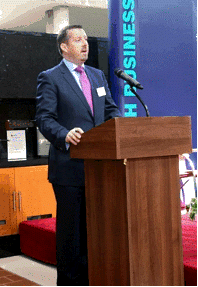21 June 2017
By Bryan T. Smyth
bryan@TheCork.ie
Ibec makes submission to the Mid-Term review of Government’s Capital Plan
Ibec, the group that represents Irish business, has called upon Government to increase investment in regional infrastructure, claiming that failure to adopt a more ambitious capital plan would accentuate the growing imbalance between the regions and the greater Dublin economy. The claims are outlined in the group’s submission to the recent public consultation on the capital investment plan for the country.
Speaking on the critical need for investment in infrastructure in Cork, Ibec Regional Director for Cork Peter O’Shaughnessy said;
“A two-speed economy has emerged over the past few decades with Dublin and the Eastern region consistently outperforming the rest of the country. During the period up to 2008, there was considerable investment in road transport connections between the capital and most of the regions. However, the motorway network was never completed and the regional cities themselves remain poorly connected to each other. Connecting cities and their regions will help spread the economic and population growth which is currently concentrated on the east coast.
“In the early years of the crisis, the lack of ambition when it came to the delivery of key infrastructure was unfortunate, but understandable, in the context of Ireland’s fiscal position. Today, it is simply unsustainable.
“In areas from roads to broadband, poorly developed infrastructure is resulting in deteriorating quality of life and increasing costs for households and business. This is a key concern and a constant source of feedback from businesses in Cork. The challenge of growing traffic congestion must be tackled. Poorly developed infrastructure is leading to extreme bottlenecks and traffic congestion in some areas including Ringaskiddy and Little Island. This is having a direct effect on expansion, business productivity and the quality of life of employees.”
Mr O’Shaughnessy said, “In Cork, the completion of the M20 Cork-Limerick motorway will be vital in establishing a competitive and distinctive complement to Dublin. The country needs an effective counter-balance to the Dublin economy. This can be best delivered through improved connectivity between our Atlantic cities and ensuring that regions are well connected to the Dublin economy and to each other.
“The Cork region currently has the poorest road surface quality in the country, impacting on the cost of doing business and competitiveness. Investing in the N28 Cork-Ringaskiddy, the N8/N25 Dunkettle Interchange, the N22 Ballyvourney-Macroom, N22 Cork Northern Ring Road and the N25 Cork-Rosslare would greatly enhance the capacity of the region to attract and retain foreign direct investment. While some projects will only be achievable over the longer-term, progress to design, planning and other preliminary stage in the projects should be funded with clear timelines identified for their delivery.
“Currently, 32% of premises in Cork do not have access to high speed broadband. Any further delays must be avoided with the roll-out of broadband. This is particularly true in relation to funding which must be put in place from the outset. As it stands, Government would need to spend a further €5 billion annually by 2021 in order to reach the 4% of GDP target. The €2.6 billion to 2021 outlined in the Government’s consultation document falls well short of levels necessary to meet the economic and demographic pressures facing the country.”
In its submission to the Department of Public Expenditure and Reform, Ibec has outlined a number of ways to fund infrastructure delivery. These include a mix of Exchequer funding involving a ring-fencing of buoyant corporate tax receipts, public private partnerships (PPPs), other non-Exchequer finance (such as the European Investment Bank) and disposal of underutilised State assets. The group also calls for a much greater role for the private sector stating that public private partnerships (PPPs) should be a key delivery mechanism for infrastructure funding.
It is Ibec’s view that the self imposed cap in place on the use of public private partnerships must be removed because it limits the country’s ability to address the infrastructure gaps. Ibec also state that Government must argue more strenuously at EU level for rules which support investment.
Mr O’Shaughnessy stated, “Right now Ireland severely lags behind our competitors when it comes to infrastructure spend. Businesses make decisions regarding their location on a number of factors and accessibility ranks highly. Cork is a strong performing region for foreign direct investment but if we want to continue to attract investment to Cork, Government must break away from the austerity mindset and ramp up spending on infrastructure in the region. Without good access investment simply does not happen.”
He concluded “Given the potential impact of Brexit on the region, it is vital that this is reflected in the mid-term review of the Capital plan. Investment in connectivity, skills and infrastructure including housing must support the future growth of the region. It makes economic sense to invest wisely now to increase productivity, employment opportunities and improve standards of living for all. This investment will pay dividends regionally and nationally.”




